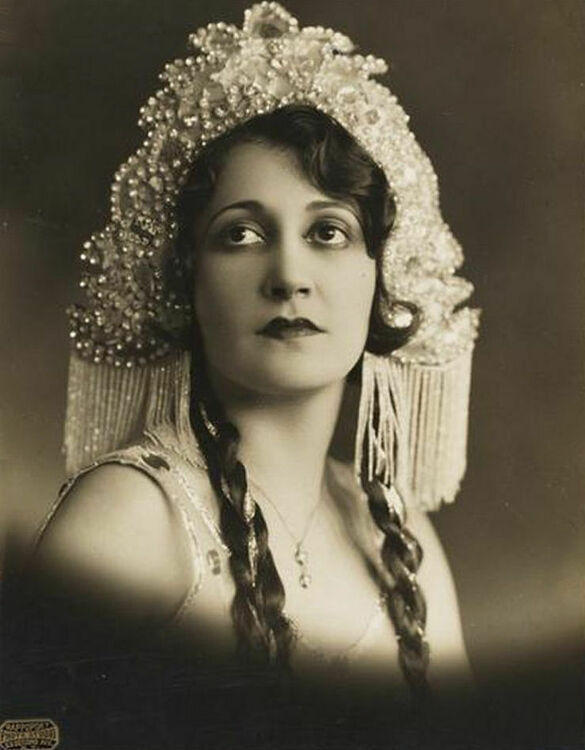
Lucy Levin
Lucy Levin was the fourth generation of a family of cantors. If her great-grandfather, a cantor from the Vilna Undertaker Synagogue, would have suspected that his great-granddaughter was going to perform in a theatre, he would have cut his throat loudly so that she would not have inherited his voice. Therefore, her grandfather, the chorus cantor of the reformed synagogue in Bialystok, did not take very seriously the possibility that his granddaughter would become an actress. He did not care that his daughter, Lucy’s mother, had married an actor and traveled with him to America.
Here in America Lucy’s father apparently did not die of hunger. Here also Lucy was born. She completed public school and high school and received a good musical education. Before that time her father had become one of the best choristers of the Second Avenue Theatre. He dreamed that his daughter would become a concert singer. If not a famous concert singer, he thought that it would be better if she got married and led a quiet, calm life. It turned out differently, however.
The young Levin had dreamed of the stage. However, she did not want to confide in her father her secret, in fear that this would make him heartbroken, because she knew that he himself had suffered a lot at the theatre. Nevertheless, she always went to see him play in the theatre, ostensibly wanting to see her father and watched with great attention everything that had happened on stage.
In 1924 Joseph Rumshinsky, for the first time, staged in the Second Avenue Theatre his operetta, "The Golden Bride." The main role was played by Lucy Finkel, the young prima donna from New York City's Grand Theatre.
"I sat at the show entranced," says Lucy Levin, "I imagined that I was performing with Miss Finkel. And sitting like this in the theatre, it suddenly became clear to me that I had to act. My name was Lucy too. I was determined."
That evening, going home with her father, she asked him diplomatically:
"What would you say, Papa, if I said to you that I want to be an actress?"
And he answered her very clearly:
"I would say, no."
"Why?"
He asked her to understand how difficult life on the stage is. He didn't want his daughter to be a follower. If she could not be big, a star, she should better sit at home.
The daughter then knelt down in front of her the father. Her mother came to help. In short, he agreed to leave the dispute in Rumshinsky's hands. Then how would it be possible for the busy conductor to hear her sing?
Her father expected Rumshinsky to be present at a certain concert. He ran, worked, and did deeds in order to get his daughter put on the program. She then sang there. However, Rumshinsky didn't hear her because he had left a half-hour earlier.
Sometime later she sang at a banquet of a Vilna branch of the Workmen's Circle, and he again did not hear her because he did not come at all.
However, someone else was at the banquet and heard her sing. This was Comrade Abraham Cahan, the editor of the Jewish "Forward" newspaper. Comrade Cahan gave the singer a compliment. He spoke out and said that she was suited for the stage.
With this Lucy Levin's fate was sealed. Her father did not wait for Rumshinsky's verdict. He agreed that his daughter should become an actress.
Young Lucy spent that summer in a hotel in the mountains. In that hotel, the Yiddish actor Samuel Goldenberg was performing in a concert that was being given there. Lucy Levin also sang there.
Thanks to that concert, the young girl became engaged in the Garden Theatre in Philadelphia, where she made her "debut" on the stage during the 1924-1925 season.
Her first performance was in Rumshinsky's "Golden Bride," in the very same role in which she had seen Lucy Finkel, that evening when she had that conversation with her father about becoming an actress.
Several months back she auditioned for membership in the Actors' Union, and she was almost unanimously admitted. That same winter the manager of the Second Avenue Theatre saw her playing in Philadelphia, and he signed her for his theatre in New York.
Initially a year earlier the young actress was unknown to the Yiddish audience. This year she's now second to the star. She came to this not by having influence, not by "pull," but thanks to her own abilities, her own talent.
The "Jewish Forward" representative asked the father of the young actress:
"Are you happy, Mr. Levin, that you daughter did not follow your advice?"
"Yes, I'm happy. She has already moved on," the father replied.
And from his face one could see that he was convinced that she would eventually pass many of the others on the stage.